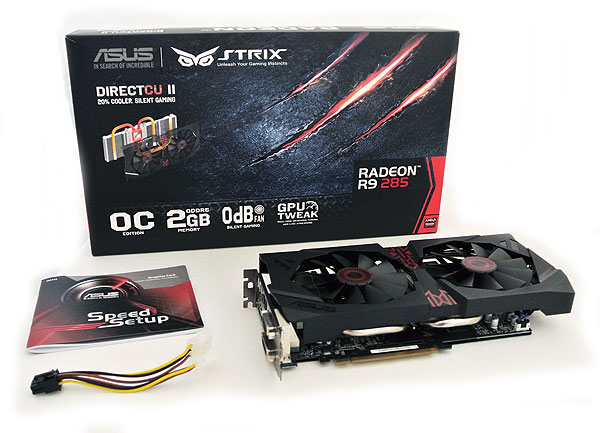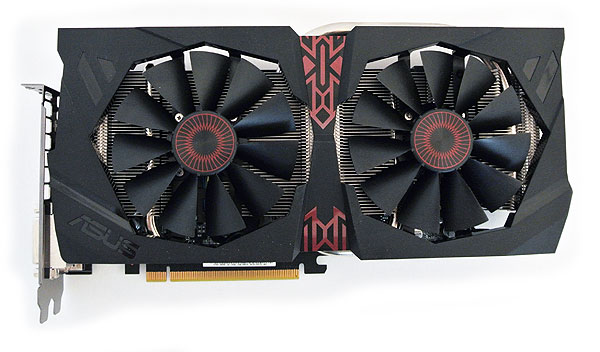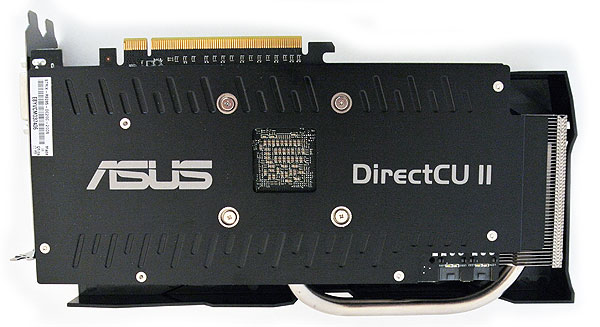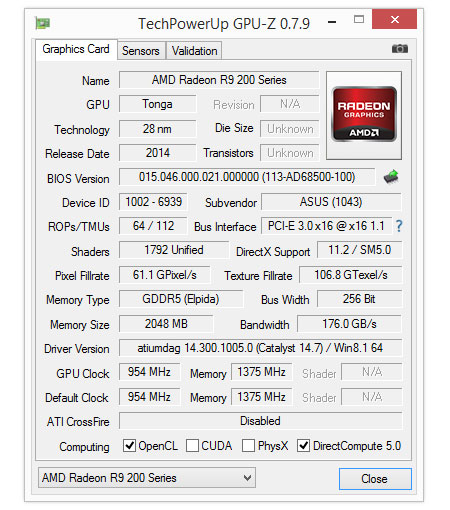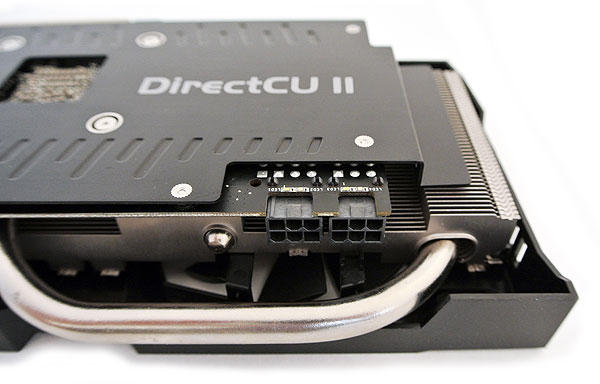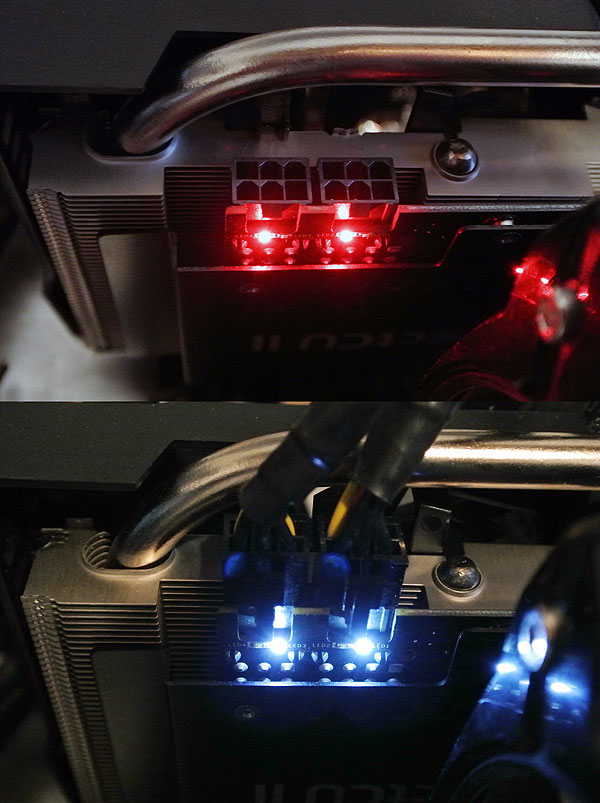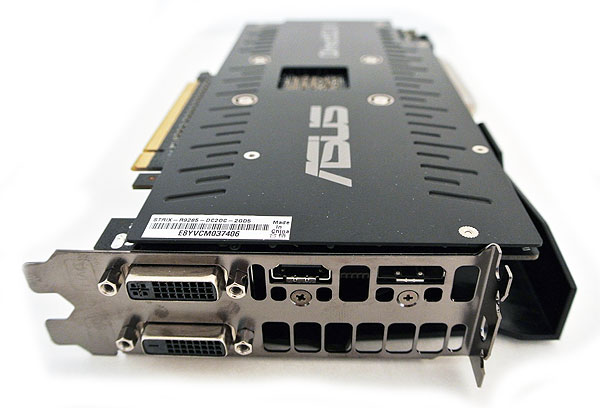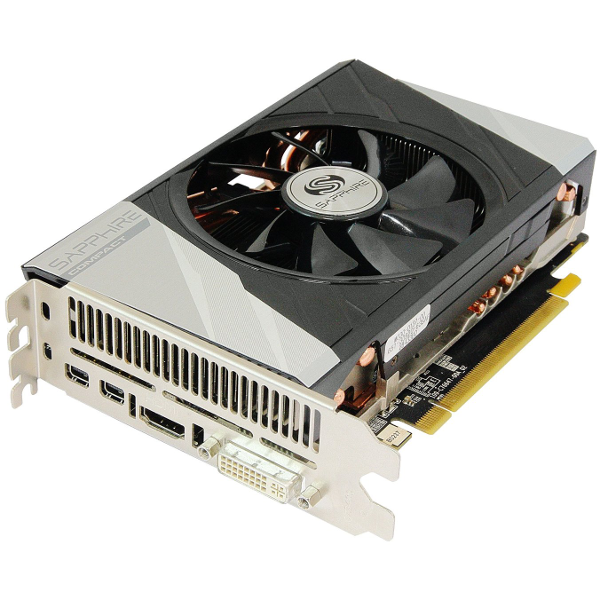AMD Radeon R9 285 Review: Tonga and GCN Update 3.0
On paper, the new Tonga-based R9 285 looks to be slightly slower than the R9 280 it is intended to replace, but there's more than meets the eye.
Why you can trust Tom's Hardware
Asus Strix Radeon R9 285
AMD has not provided a reference design for the Radeon R9 285, leaving the manufacturers to put their own spin on the card. Our test sample is from Asus, marketed under their performance-oriented Strix line, and we'll be using it to provide game benchmark results.
| Asus Strix Radeon R9 285 | |
|---|---|
| Dimensions | 276 mm (L) x 135 mm (H) x 40 mm (D) |
| Weight | 859 g |
| Form Factor | Dual Slot |
| PCIe | 2x 6-Pin |
| Connectors | 1x DVI-I (Dual Link, + analog)1x DVI-D (Dual Link)1x HDMI1x DisplayPort |
Asus' Radeon R9 285 sports the company's trademark black highlighted with a dark red tribal art design. The PCB is 9" by 4.6", but the cooler shroud extends to 10.5", giving the impression of a larger, more serious piece of performance hardware. At 1 lb 14 oz, it doesn't feel as light as we'd expect it to from the size of the PCB, probably thanks to the metal backplate. Despite the plastic cooler shroud, the card feels very sturdy and well put together.
Asus' card has a 954 MHz target GPU clock rate, 36 MHz faster than AMD's reference specification. The 2 GB of onboard graphics RAM running at a 1375 MHz GDDR5 memory clock is in line with AMD's guideline, though. We may see 4 GB models in the future, but these will likely be a rare exception rather than the rule.
The aluminum heatsink features three large 10mm heatpipes and is cooled by two 95 mm low-profile fans. The card's 190 Watt TDP is satisfied by two six-pin PCIe power connectors. ASUS cuts a relief out of the PCB so that the power connector clips face the opposite direction of the heatsink, which makes for much easier removal.
Both connectors feature an LED that glows red when a power cord isn't attached, and blue when it is connected properly. These details might not sound important but it really leaves a positive impression. Note the lack of Crossfire connector on the card, as the Radeon R9 285 does not need a bridge to operate in tandem.
Asus' new card comes with a DVI-I, DVI-D, full-sized DisplayPort, and full sized HDMI output.
Get Tom's Hardware's best news and in-depth reviews, straight to your inbox.
Current page: Asus Strix Radeon R9 285
Prev Page The Radeon's GCN Is Updated Again: The Tonga GPU Next Page Gigabyte R9 285 WindForce OCDon Woligroski was a former senior hardware editor for Tom's Hardware. He has covered a wide range of PC hardware topics, including CPUs, GPUs, system building, and emerging technologies.
-
JeanLuc The idle power consumption numbers are odd, the previous generation cards use less then at idle didn't they? Not that 15 watts is going to break anyone's bank account but its strange nether the less.Reply
Good to see AMD have tackled the noise and temperature issues that have plagued it's previous 28nm cards as well but it's a bit late in the day given that 20nm shouldn't be to far off now. -
gear999 Really nice article guys. I'm impressed by how the 285 actually was able to keep up with the 280. And I'm shocked by the fact that The $250 Nvidia card loses to a $170 AMD card. Thank god I bought a GTX 770 :PReply
Also, on the last page, you guys wrote R7 270X instead of R9, and in the chart it says "Relative to Radeon HD 7950 Boost". Oh, and in the Pros section, it says the 285 has R9 260 like performance?
Thanks for the proofread, fixing it now! :) -
Mike Stewart wow ! at 250$ it actually is a better card even than 280X !! and it was meant for 760....but as it shows here even a 270X is a WAY better card than 760....Reply -
tomfreak Had the tonga 285 come with a 6GHz/7Ghz GDDR5 & 4GB VRAM, the result will be a lot different. Whats with AMD putting on a 5500 memory? facepalm.jpgReply -
srap While this is really a third GCN iteration, showing it as a version number of 3.0 (as in: "Tonga and GCN Update 3.0") makes no sense for me.Reply -
Amdlova some one write this with a .45 acp on the head. I see some error on numbers models etc...Reply
I prefer get a r9 280 and downclock get same results. I can't see the point of this heat on graphics. maybe drivers. OR THIS IS HAWAII XT! Too much Heat! -
Amdlova ReplyI wanted to see the GPU die and OCing results. :(
I think the guys see if they hit the OC the room Will burn! maybe a problem with drivers.
Last time i see that Heat 290x tests. lol! -
Gillerer On the first page, it says "Improvements are always welcome but with the memory interface cut in half compared to the Radeon R9 280,...".Reply
But in fact, the memory interface was cut by a third (384 bit -> 256 bit), not half.
Good point, fixed! Thx.
